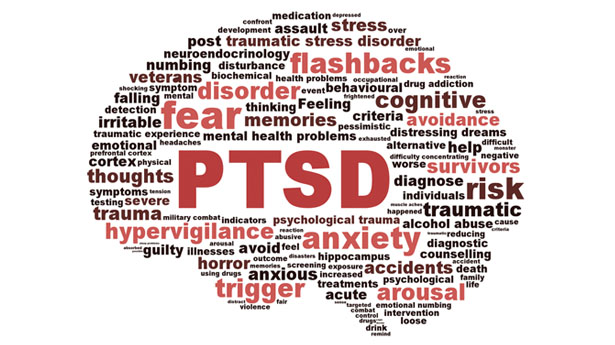
PTSD may develop after a person is exposed to one or more traumatic events, such as assault, warfare, serious injury, serious psychological trauma or threats of imminent death. The diagnosis may be given when a group of symptoms, such as disturbing recurring flashbacks, avoidance or numbing of memories of the event, and hyper-arousals, continue for more than a month after the occurrence of a traumatic event. Prisoners of war exposed to harsh treatment are particularly prone to develop PTSD. The acute presentation of symptoms can be affective, cognitive, perceptional, emotional and behavioral responses, which are relatively normal responses to gross psychological trauma. However, if the symptoms persist, they can take on a whole life of their own and may be maintained by inadvertent reinforcement.
Sleep disorders such as recurrent dreams, nightmares, staying asleep or falling asleep are all too common in patients with PTSD. OSA has not necessarily been well described as a noticeable feature of PTSD. However, there are some case reports showing significantly improved PTSD in patients being treated for OSA. Not only that, more than 70% of those who carry a diagnosis of PTSD, are also at a higher risk for the diagnosis of OSA. Combat Veterans and anyone suffering with PTSD or with difficulty sleeping, should be considered for an evaluation of sleep disordered breathing prior to additional treatment, including pharmacotherapy researchers said.
An additionally relevant study published by the ACP in the Chest Journal investigated the Impact of PTSD on Continuous Positive Airway Pressure adherence in patients with OSA.
According to their conclusions, therapeutic adherence or compliance to the CPAP mask is frequently poor among patients with PTSD and/or OSA. When OSA is left untreated it adversely impacts treatment outcomes for the respective PTSD. The gold standard of treatment for OSA is Continuous Positive Airway Pressure (CPAP), and achieving compliance is often very challenging. CPAP Therapy is a prescribed machine to help a person who has OSA breathe easily and consistently, by sending positive air pressure in the throat, preventing the airway from collapsing throughout the night and obstructing breathing. The unit consists of a small air pressure generator connected by tubing to a nasal mask or full-face mask that is worn at night during sleep. Not very attractive but the alternative is far worse.
Poor sleep quality, including insomnia and sleep disturbances, are common among patients with PTSD, and can also impair CPAP adherence. It’s a vicious cycle. ACP sought to determine the impact of PTSD on CPAP adherence and found patients with PTSD had significantly lower rates of adherence to CPAP therapy. This may create an additional obstacle to care in this already compromised and challenging patient population.
CPAP Effects on PTSD Symptoms
Patients suffering with PTSD often experience severe nightmares that cause the individual to relive the traumatic event(s). In some cases, the presence of OSA can lead to the start of nightmares in a person with post-traumatic stress disorder.
Researchers sought to compare nightmare-related effects of regular CPAP use in combat veterans affected by both OSA and PTSD. They accomplished this by measuring the number of weekly nightmares prior to CPAP treatment and comparing that number to the number of weekly nightmares experienced after 6 months of using CPAP therapy. After making their comparisons, the study’s authors concluded that CPAP therapy produces meaningful declines in the number of nightmares associated with PTSD. They also concluded that the greatest benefit of treatment appears in individuals who are CPAP compliant and adhere to the treatment on a regular basis.
These studies along with countless others highlights the critical importance of diagnosing and treating OSA. If you are prescribed CPAP therapy, it is equally critical to stay compliant or find specialist who can help identify a tolerable alternative to treatment. The healthcare community is finding out more and more everyday about the importance of creating awareness, getting a diagnosis and finding treatments for OSA, especially for those whose health is already compromised. #StoptheSnore
